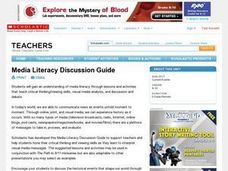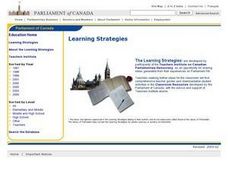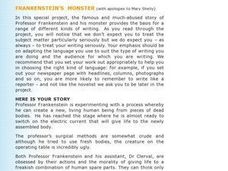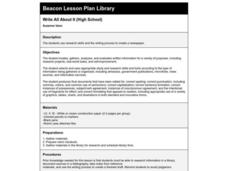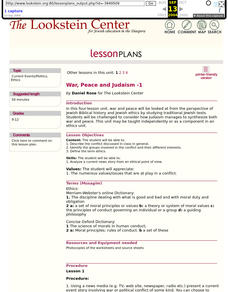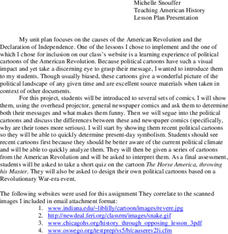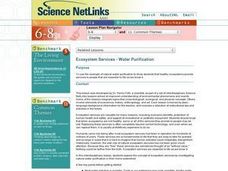Curated OER
LCROSS Moon Mission
Young scholars read to discover the sequence of events of the LCROSS moon mission. In this space science lesson, students read an article about the LCROSS moon mission and the events that took place. After reading, young scholars...
Curated OER
Writing a Letter to the Editor
Learners examine the structure and elements of a letter to the editor. They identify letter elements, read and discuss newspaper letters, and write and submit a letter to a local newspaper.
Curated OER
Writing a Letter to the Editor
Students identify the main elements/structure of a letter to the editor. They brainstorm for thoughts and opinions on a specific topic and write a first draft of a letter to an editor of a newspaper. They give each other preliminary...
Curated OER
Civil Disobedience Action Plan
Young scholars investigate incidences of civil disobedience. For this civil disobedience lesson, students watch a video and read a newspaper article on civil disobedience. Then, in groups, they search a current newspaper for examples of...
Curated OER
It is Our Right-Don't Waste It!
Learners explore the basic rights granted to all American citizens by the U.S. Constitution in the light of women's issues. The women's suffrage movement, the role of Susan B. Anthony, and the timeline of events on voting rights are...
Curated OER
The Nile
Students recognize the Nile River played an important role in the lives of ancient Egyptians and still does today. They prepare a newspaper written in English and produced with advanced technology centered around researched information.
Curated OER
Media Literacy Discussion Guide
High schoolers examine and analyze visual media and its messages critically. They determine whether specific media messages inform, entertain, or persuade and what factors influence the media. Using primary sources, they participate in...
Curated OER
Cartoons for the Classroom: Mosque Debate
In this current events worksheet, students analyze a political cartoon about the New York City Mosque Debate and respond to 3 talking point questions.
Curated OER
It's Debatable!
Students examine the basic elements and vocabulary of debating. They research an issue and write a letter to the editor of the local newspaper, and role-play a Parliamentary debate on a particular bill.
Curated OER
Canada's Press: Making a Historical Newspaper
Young scholars examine several colonial-era editorial cartoons. They evaluate the effectiveness of the techniques the cartoonists used to display their messages and share one editorial cartoon with the class emphasising what message has...
Curated OER
Afghanistan: A Rich History
Students study events in Afghanistan in the 1980s and 1990s. They discuss the role of the international community in the rise of the Taliban to power, and consider what can be learned from our country's involvement in Afghanistan.
Curated OER
The Right to Remain Resilient
Students examine the Civil Rights Movements in the U.S., both current and historic. In small groups students investigate a specific civil rights group, create an illustrated timeline, noting key events, people, and state and federal laws.
Curated OER
Making Headlines
Students identify acts of kindness in the news. In this random acts of kindness lesson, students discuss kindness, find a news article about an act of kindness that took place in another country, locate the country on a map, and write a...
Smithsonian Institution
Giving Speeches: George Washington's First and Second Inaugural Addresses
Young scholars discuss the purpose of the President of the United States giving an inaugural address. They describe their impressions of any inaugural speaches they have heard or read. Students research events leading up to Washington's...
Curated OER
Un-Presidented Election
Students explore the results of the 2000 presidential election. They look back at important issues in the campaign and write newspaper articles which cover specific angles on the election.
Curated OER
Democracies in North America: Canada, the United States, and Mexico
Pupils examine democratic values. In this democracy activity, students research the political systems of Canada, Mexico, and the United States in order to compare and contrast them. Pupils also discuss domestic and international events...
Curated OER
Frankenstein's Monster
Students read Mary Shelly's Frankenstein. Using situation and question prompts, students write various essays, letters, and articles concerning the events in the story from different character's point of view.
Curated OER
The Environment In The News
Students explore environmental issues. Using a newspaper, students scan headlines for articles related to environmental or sustainability issues. From the article title, students predict the article's intent and then read the article for...
Curated OER
News-2 You Weekly Activities
Students complete activities from a special education newspaper. In this News-2 lesson, students read the paper, play games, and complete worksheets. Subscription to newspaper is required.
Curated OER
Write All About It
Fourth graders use research skills and the writing process to create a newspaper. Although students work in groups to complete the final draft of the newspaper, each student is responsible for doing his or her own research and writing...
Curated OER
War, Peace and Judaism 1
Students describe the conflict discussed in class, identify the groups involved in the conflict and their various interests, and define the term ethics. They analyze a current news story from an ethical point of view.
Curated OER
News Flash
Pupils research each year from 1933 to 1945 and come up with a newspaper headline to hang up for the rest of students to see.
Curated OER
American Revolution
Students review the events leading to the American Revolution and the Declaration of Independence. Using the internet, they examine many different political cartoons from the time period and discuss the political atmosphere. In groups,...
Curated OER
Ecosytems: Water Purification
Middle schoolers explore how ecosystems purify water and what kinds of things humans do that alter these processes. They use a website to access information on local watersheds and develop a "river" newspaper








